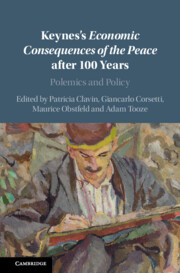Book contents
- Keynes’s Economic Consequences of the Peace after 100 Years
- Keynes’s Economic Consequences of the Peace after 100 Years
- Copyright page
- Contents
- Plates
- Figures
- Tables
- Contributors
- Preface
- Acknowledgements
- 1 Lessons of Keynes’s Economic Consequences in a Turbulent Century
- 2 The Making of a Classic: Keynes and the Origins of The Economic Consequences of the Peace
- 3 Keynes’s Economic Consequences (1919)
- 4 “Too Bad to Be True”: Swedish Economists on Keynes’s The Economic Consequences of the Peace and German Reparations, 1919–29
- 5 Revisionism as Intellectual-Political Vindication, or the French Receptions of Consequences after the Two World Wars (1919–1946)
- 6 Between Cambridge, Paris, and Amsterdam
- 7 Keynes, the Transfer Problem, and Reparations
- 8 The Speculative Consequences of the Peace
- 9 Why Was Keynes Opposed to Reparations and a Carthaginian Peace?
- 10 One Case Where The Economic Consequences of the Peace Mattered
- 11 Keynes and International Trade Politics after the First World War
- 12 Gold, International Monetary Cooperation, and the Tripartite Agreement of 1936
- 13 Exchange Rates, Tariffs and Prices in 1930s Britain
- 14 “Unusual, Unstable, Complicated, Unreliable and Temporary”: Reinterpreting the Ebb and Flow of Globalization
- 15 Keynes’s Arc of Discovery
- 16 Keynes, The Economic Consequences of the Peace, and Popular Perceptions of the First World War
- Index
- Plate Section (PDF Only)
- References
10 - One Case Where The Economic Consequences of the Peace Mattered
The Reshaping of Economic Mindset in Early Republican Turkey
Published online by Cambridge University Press: 14 December 2023
- Keynes’s Economic Consequences of the Peace after 100 Years
- Keynes’s Economic Consequences of the Peace after 100 Years
- Copyright page
- Contents
- Plates
- Figures
- Tables
- Contributors
- Preface
- Acknowledgements
- 1 Lessons of Keynes’s Economic Consequences in a Turbulent Century
- 2 The Making of a Classic: Keynes and the Origins of The Economic Consequences of the Peace
- 3 Keynes’s Economic Consequences (1919)
- 4 “Too Bad to Be True”: Swedish Economists on Keynes’s The Economic Consequences of the Peace and German Reparations, 1919–29
- 5 Revisionism as Intellectual-Political Vindication, or the French Receptions of Consequences after the Two World Wars (1919–1946)
- 6 Between Cambridge, Paris, and Amsterdam
- 7 Keynes, the Transfer Problem, and Reparations
- 8 The Speculative Consequences of the Peace
- 9 Why Was Keynes Opposed to Reparations and a Carthaginian Peace?
- 10 One Case Where The Economic Consequences of the Peace Mattered
- 11 Keynes and International Trade Politics after the First World War
- 12 Gold, International Monetary Cooperation, and the Tripartite Agreement of 1936
- 13 Exchange Rates, Tariffs and Prices in 1930s Britain
- 14 “Unusual, Unstable, Complicated, Unreliable and Temporary”: Reinterpreting the Ebb and Flow of Globalization
- 15 Keynes’s Arc of Discovery
- 16 Keynes, The Economic Consequences of the Peace, and Popular Perceptions of the First World War
- Index
- Plate Section (PDF Only)
- References
Summary
Economic Consequences enjoyed an outright favourable reception in Turkey. This chapter illuminates the circumstances that made this possible. Of the Carthaginian peace-imposing treaties of the Paris Conference (1919), only the Treaty of Sèvres (1920) concerning the Ottoman Empire was annulled after a battleground victory (1922), and replaced by the Treaty of Lausanne (1923). An officer and a diplomat, Ali Fethi (Okyar), soon to become prime minister of Turkey, was a prisoner of war in Malta when he heard of Keynes’s book, acquired a copy, and translated it in 1920. Because the national leaders were anxious to know what awaited them in the peace talks, given the huge Ottoman debt they inherited, impending war reparations, and the discriminatory treatment they suspected, upon Ali Fethi’s release and return, the translation was published in 1922 by the official press in Ankara. It helped prepare the Turkish delegation to the Lausanne conference. This case provides us with an early example of Economic Consequences as a policy instrument in favour of a new international integration serviceable to peace and reconstruction in the face of an international conflict.
Keywords
- Type
- Chapter
- Information
- Keynes's Economic Consequences of the Peace after 100 YearsPolemics and Policy, pp. 257 - 279Publisher: Cambridge University PressPrint publication year: 2024

